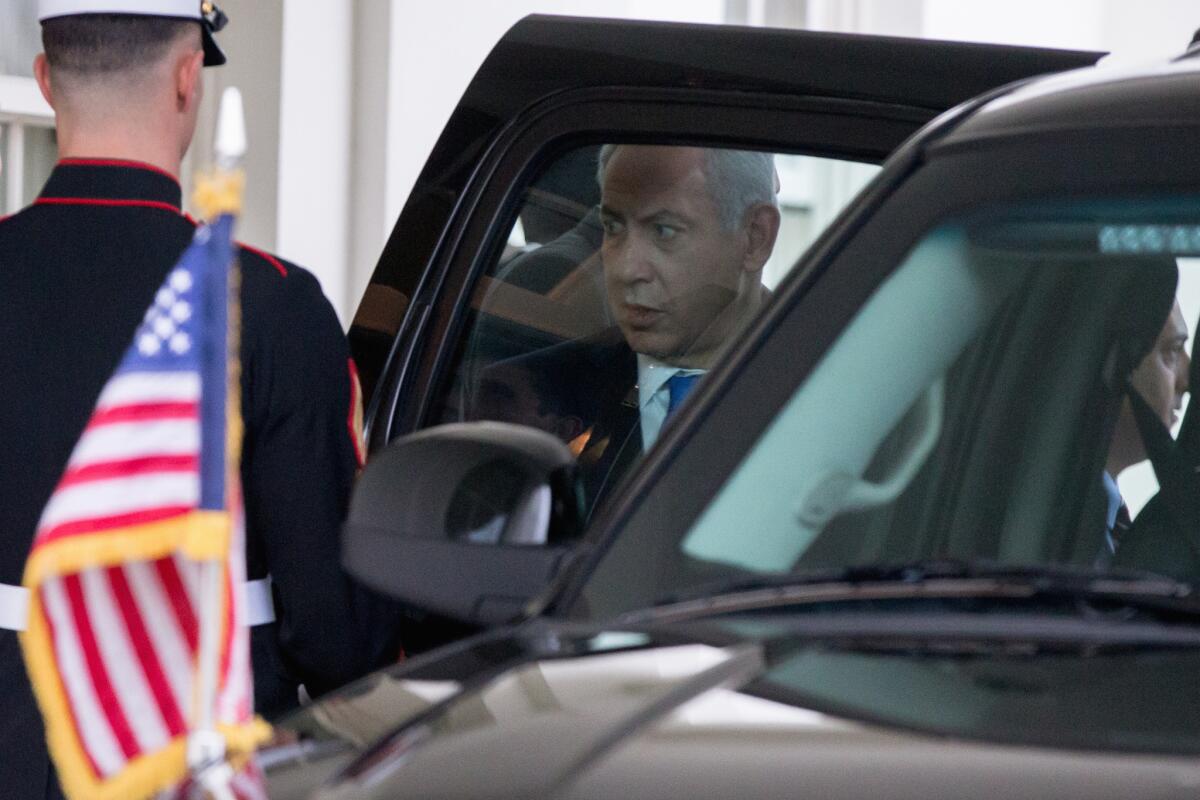Obama and Israel’s Netanyahu put aside mutual mistrust during White House meeting

Israeli Prime Minister Benjamin Netanyahu leaves the White House on Monday after meeting with President Obama.
President Obama and Israeli Prime Minister Benjamin Netanyahu sought to move past their bitter disagreement over the Iran nuclear deal and to focus on other mutual interests, including enhanced U.S. military aid for Israel, in a long-awaited Oval Office meeting Monday.
In their first sit-down summit after a year of rocky relations, the two leaders made a public show of praising their countries’ unique political, cultural and military ties.
They grasped each other’s hands for two strong but unsmiling handshakes before television cameras, and they pledged fidelity to America’s commitment to Israeli security in a tumultuous part of the world.
Obama condemned a recent surge of Palestinian violence against “innocent Israeli citizens” and reaffirmed Israel’s right to protect itself.
Netanyahu pledged his support for a two-state solution based on a “demilitarized Palestinian state that recognizes the Jewish state.”
NEWSLETTER: Get the day’s top headlines from Times Editor Davan Maharaj >>
The White House has made it clear that it won’t try to restart the peace process before Obama leaves office in 2017. The administration has tried and failed twice before.
That frees Netanyahu to gloss over his past resistance to a two-state solution, and the absence of any negotiations with the Palestinian Authority.
Neither side thinks Obama and Netanyahu will end their mutual mistrust before Obama leaves office. But aides said they would set aside their differences to work together on issues of critical concern.
Top U.S. and Israeli military officials have begun talks on a new memorandum of understanding, for example, that could substantially boost American military aid to Israel over the next decade.
Both sides are concerned about Iran’s growing support for the Hezbollah militia and other proxy groups, aid that is likely to increase after Iran gains access to tens of billions of dollars in frozen funds if it meets its commitments under the nuclear deal.
The two leaders were never close, but relations nosedived when Netanyahu came to Washington in March to publicly campaign against Obama’s support for an international agreement to prevent Iran from being able to build a nuclear bomb.
Speaking to reporters before their meeting, the leaders emphasized points of agreement and avoided areas where they disagree.
Obama said his administration is committed to halting Iranian “destabilizing activities” in the Middle East, a major Israeli concern.
He condemned Palestinian violence, though he didn’t raise the question of official “incitement” of those attacks, which would have pleased Israeli officials.
Netanyahu promised his support for “two states for two people,” which long has been U.S. policy, although there is no movement toward a resumption of negotiations.
“The president continues to stand at the ready to facilitate those kinds of conversations,” White House Press Secretary Josh Earnest said. “But obviously we’ve got a long way to go before something like that is likely to occur.”
In that sense, the comments reflected the resignation of two long-term negotiating partners who still can’t break their biggest logjam.
Still, the encounter was mild compared with their Oval Office meeting in May 2011, when Netanyahu appeared to lecture Obama on refugees and Jewish history.
Seated in the same leather armchair Monday, Netanyahu was more conciliatory and diplomatic in his statement.
He spoke optimistically about “friendship,” leaving it vague whether he meant leader to leader or just country to country.
“We’re with each other in more ways than one,” Netanyahu said.
For news about President Obama and the Obama administration, follow me on Twitter: @cparsons
ALSO
Russia’s track and field athletes should be banned from competition, anti-doping agency says
Air Force struggles to add drone pilots and address fatigue and stress
Supreme Court gives police using deadly force in chases more immunity
More to Read
Start your day right
Sign up for Essential California for news, features and recommendations from the L.A. Times and beyond in your inbox six days a week.
You may occasionally receive promotional content from the Los Angeles Times.








